Best AI Chatbot Software to Buy in 2026 (Top 7 Platforms Ranked)

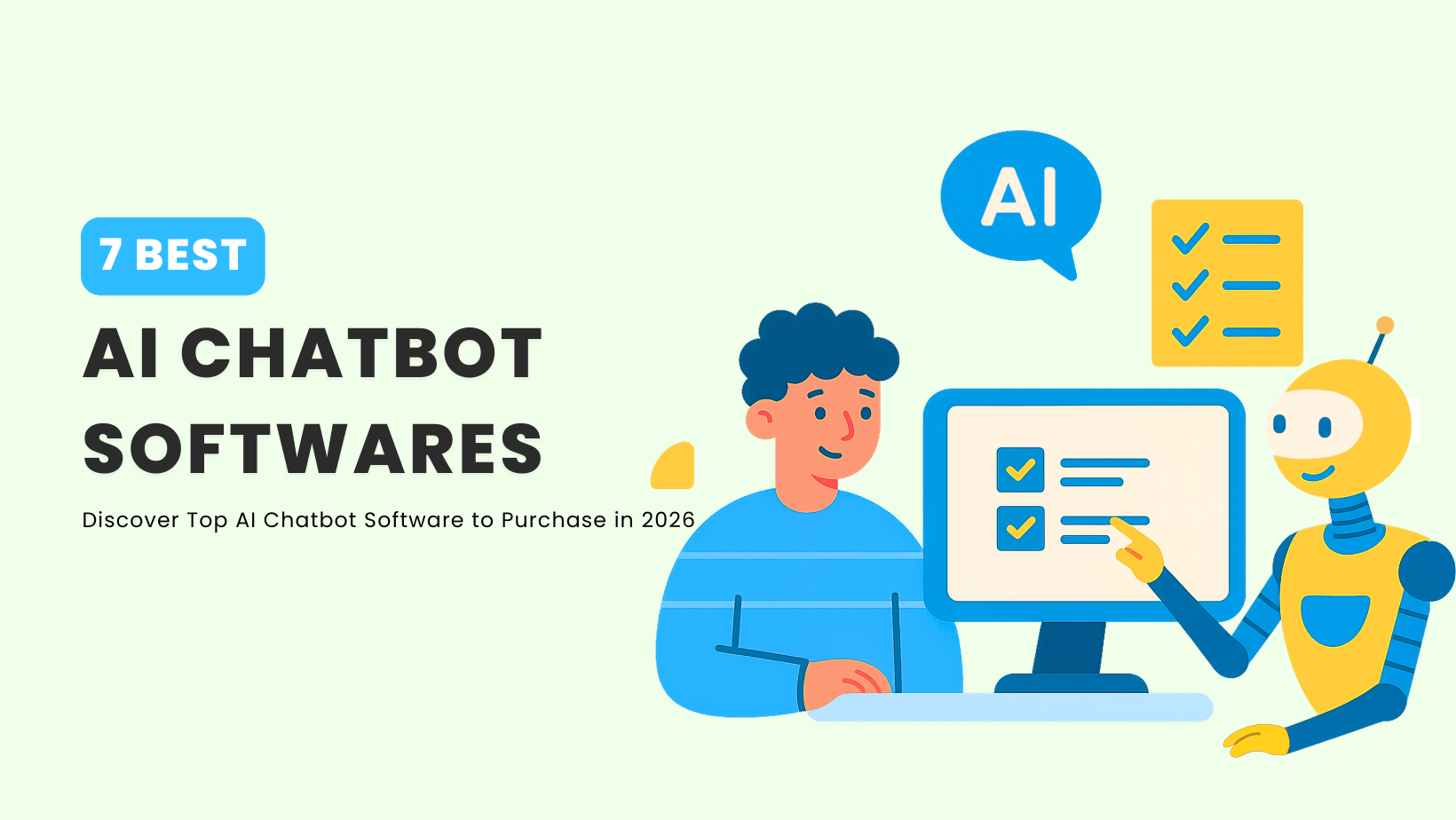
AI chatbots are now a must-have for any business aiming to improve customer service and boost sales. They answer everyday questions fast, help them qualify leads, and take care of bookings or appointments.
A few years back, it took an entire team to manage these tasks. Now, a single AI agent can do them all. Customer expectations have shifted too; more than half of people now prefer using an AI agents instead of waiting for a human for simple requests.
Of course, not every chatbot is right for every business. A small online store will have different need than a large company managing customer support for thousands of users. The best chatbot is the one that matches your goals, integrates with your current tools and help you improve your KPI’s.
The wrong choice leads to wasted time, unnecessary costs, and unhappy customers.
This article explains how to choose the right chatbot for your business. It covers the main types of chatbots, their best uses, and compares the top platforms in 2026 by features, pricing, and real-world examples.
In 2026, AI chatbots are moving beyond simple conversations to full-scale automation. Businesses use them to manage customer support, sales, and HR workflows without adding staff. YourGPT leads as a complete AI-first platform for creating, training, and deploying agents across web, WhatsApp, email, and more. ManyChat focuses on social media automation, Gupshup powers transactional messaging at scale, and Kore.ai serves large enterprises with deep NLP and security compliance. Leena AI specializes in HR automation, Yellow.ai supports global, multilingual engagement, and Chatfuel remains a go-to for small brands managing Messenger and Instagram interactions.
Key Takeaway: AI agents are redefining how businesses operate — choose a platform that matches your size, goals, and channels to gain measurable efficiency and customer satisfaction in 2026.
Support software includes tool or system used by businesses to manage customer inquiries, resolve issues, and communicate effectively. Typically, when support queues start growing, companies respond by adding more agents to the team. That can help temporarily, but it’s not the only option.
Look at an e-commerce inbox. Around 30% of customers just ask about order status. Another 15% have questions about returns or refunds. The remaining queries usually involve basic troubleshooting. Nearly all of these repetitive questions can be automated.
Modern chatbot software goes beyond matching keywords. It understands what customers are actually writing. If someone asks about shipping and then shifts suddenly to refunds, the chatbot naturally adapts, following the conversation as it evolves.
Traditional rule-based chatbots follow fixed scripts.
Think about a telecom provider that faces the same questions daily about dropped connections, slow speeds, or router resets. A scripted chatbot can handle these standard scenarios easily, stepping customers through common solutions and escalating to human agents when needed.
But these scripted bots quickly reach their limits. Even slight deviations in phrasing or uncommon scenarios throw them off, forcing customers to repeat themselves or start over. While some predictable workflows can still benefit from scripted interactions, businesses now rarely depend solely on these traditional solutions.
AI agents are changing how chatbots work by performing tasks rather than just answering questions.
Say a customer wants to return a product. Older chatbots would send a link to a return form, shifting effort back to the customer. An AI agent directly manages the return process during the conversation itself. It checks the return eligibility, generates shipping labels, updates inventory, and schedules pickup, handling everything in real-time without breaking interaction.
Behind the scenes, AI agents integrate directly with internal databases, billing platforms, and inventory systems. Complex processes that once required collaboration across multiple teams can now be solved instantly.
Perhaps the most valuable advantage is their ability to handle unexpected or complicated requests. While older rule-based bots stall when confronted with new scenarios, AI agents adapt. They don’t get it perfect every single time, but they’re far less likely to default to an unhelpful “I don’t understand.”
Chatbots are no longer just a support tool. They have become a core part of how businesses interact with customers, generate revenue, and manage internal processes. From customer service to sales to HR automation, chatbots help companies scale efficiently while keeping costs under control.
Customers now expect businesses to be available around the clock. Chatbots make this possible by reducing response times, handling repetitive questions, and guiding people to the right resources instantly.
Instead of waiting for a form submission, chatbots can qualify leads in real time. They capture contact details, identify intent, and hand prospects directly to sales teams, turning website traffic into real opportunities.
Within companies, chatbots save HR teams hours of repetitive work. They can answer common employee questions such as leave balances, policies, or feedback requests, which frees HR staff to focus on strategic initiatives.
Scheduling no longer requires back-and-forth emails. With a chatbot, customers can check availability, confirm times, and book appointments instantly, improving both speed and convenience.
Modern chatbots do more than answer questions. They provide account updates, generate reports, and even assist with financial queries. This makes them valuable not only for customer interactions but also for internal teams managing operations.
| Platform Name | Best For | AI Model | Starting Price |
|---|---|---|---|
| YourGPT | Unified AI platform for support, sales, and ops across web, WhatsApp, email, voice | Multi-LLM (GPT-4o, Claude, Gemini, Llama, Qwen, +) | Tiered plans / quote |
| ManyChat | Marketing automation on Instagram, WhatsApp, and Messenger | Rule-based flows; optional AI via integrations | Entry plan available |
| Gupshup | High-volume conversational commerce and transactional messaging | LLM-agnostic (OpenAI and others) + in-house tools | Usage-based / quote |
| Kore.ai | Enterprise conversational AI with security, compliance, voice + chat | Proprietary NLP + LLM connectors | Contact sales |
| Leena AI | HR automation and employee self-service at scale | LLM-powered (model-agnostic) | Contact sales |
| Yellow.ai | Global, multilingual customer engagement across 35+ channels | Generative AI + industry NLP; LLM-hybrid | Contact sales |
| Chatfuel | Simple automation for Instagram and Messenger DMs | Rule-based with AI add-ons via APIs | Entry plan available |
The chatbot market is crowded, and every platform promises powerful AI and automation. To help you cut through the noise, this ranked list highlights the top software in 2026, complete with features, pricing, and the business scenarios where each one performs best.
1. YourGPT – AI-first platform with no-code bot creation, Human In the Loop, omnichannel support (Web, WhatsApp, Instagram, Slack), advanced RAG-based AI, and real-time analytics.
2. ManyChat – Marketing-driven chatbot built for Messenger, WhatsApp, and Instagram. Perfect for automated campaigns, lead capture, and social media sales funnels.
3. Gupshup – Conversational messaging platform at scale, supporting WhatsApp, SMS, and RCS. Strong for transactional workflows, eCommerce, and customer engagement.
4. Kore.ai – Enterprise-grade AI chatbot with advanced NLP, compliance features, and omni-channel deployment (voice, web, Teams, Slack). Suited for organizations needing secure, large-scale automation.
5. Leena AI – HR-focused chatbot that answers employee FAQs, manages leave requests, and automates HR workflows. Helps reduce repetitive tasks for internal teams.
6. Yellow.ai – Global AI chatbot platform supporting 135+ languages and multi-channel engagement. Known for generative AI workflows tailored to specific industries like retail, banking, and healthcare.
7. Chatfuel – Easy-to-use chatbot for Instagram and Facebook Messenger. Automates DMs, FAQs, and sales processes for small to mid-sized businesses that rely heavily on social media.

YourGPT is a complete AI-first platform that allows businesses to build, train, and deploy custom AI agents on web, email, WhatsApp, Telegram, and other channels without coding. These agents automate customer support, sales, and internal operations by connecting with your data and systems in real time.
Businesses looking for a single AI platform to unify support, sales, and operations across multiple channels with minimal technical overhead.
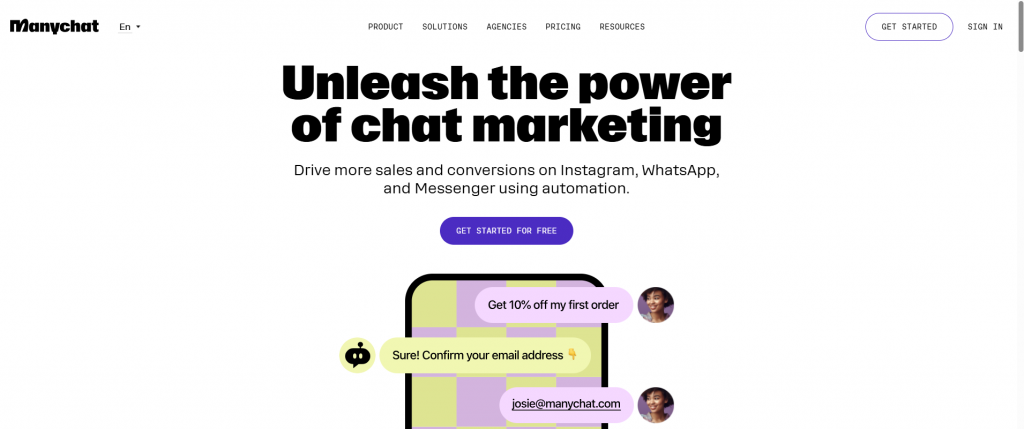
ManyChat specializes in marketing automation for social channels like Instagram, WhatsApp, and Facebook Messenger. Its visual Flow Builder makes it simple for businesses to design customer journeys, capture leads, and automate campaigns.
Small to mid-sized businesses looking to increase engagement and sales through social messaging platforms.
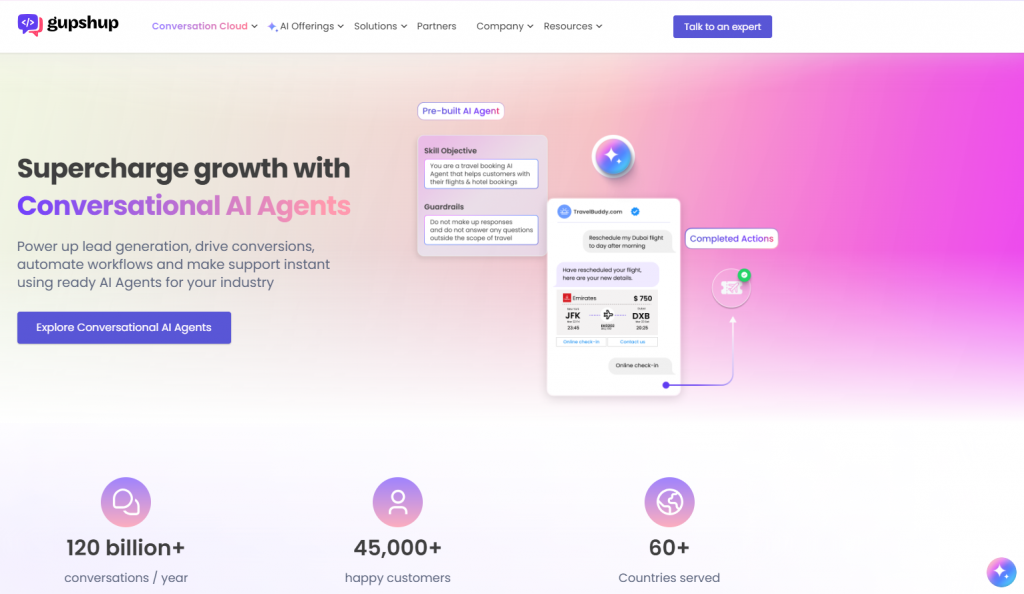
Gupshup is a leading conversational messaging platform with strong support for commerce and customer engagement across channels. Its Auto Bot Builder can generate conversational flows from a website URL or business content instantly.
Enterprises in retail, fintech, and eCommerce that need high-volume, multi-channel engagement.
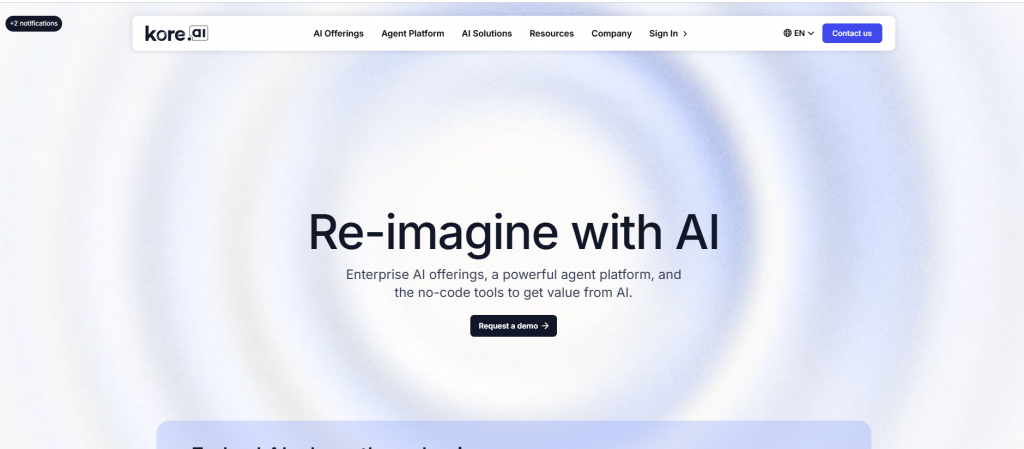
Kore.ai provides a powerful conversational AI platform designed for enterprises that need secure, large-scale deployments. It offers strong NLP, customizable workflows, and industry-specific solutions.
Large enterprises that require secure, compliant, and deeply customizable AI deployments.
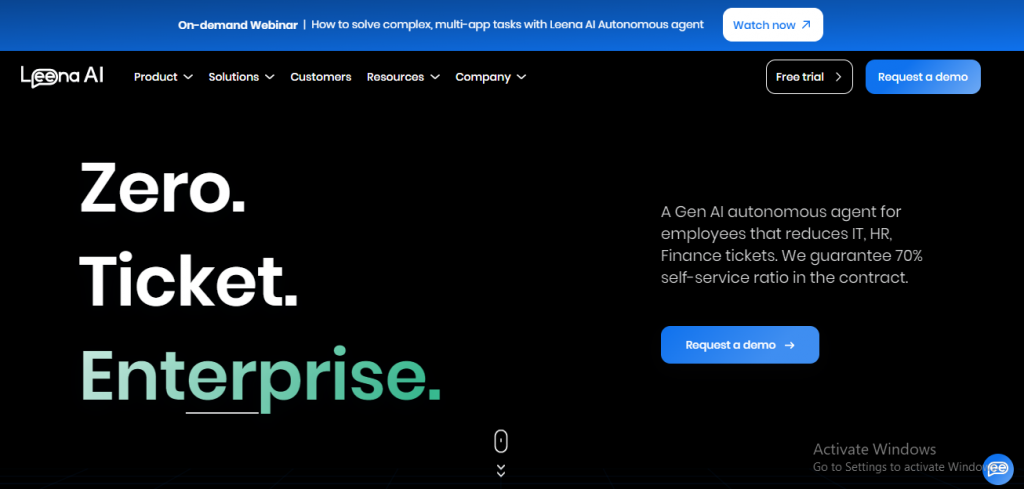
Leena AI focuses on automating HR processes and employee experience. It handles everything from answering internal FAQs to managing workflows like leave requests and policy updates.
Enterprises looking to improve HR efficiency and employee experience with an AI-powered assistant.

Yellow.ai (formerly Yellow Messenger) delivers enterprise conversational AI with strong multilingual and multi-channel capabilities. It’s designed for companies operating globally across multiple touchpoints.
Global enterprises needing multilingual, multi-channel AI chatbots for customer support and operations.
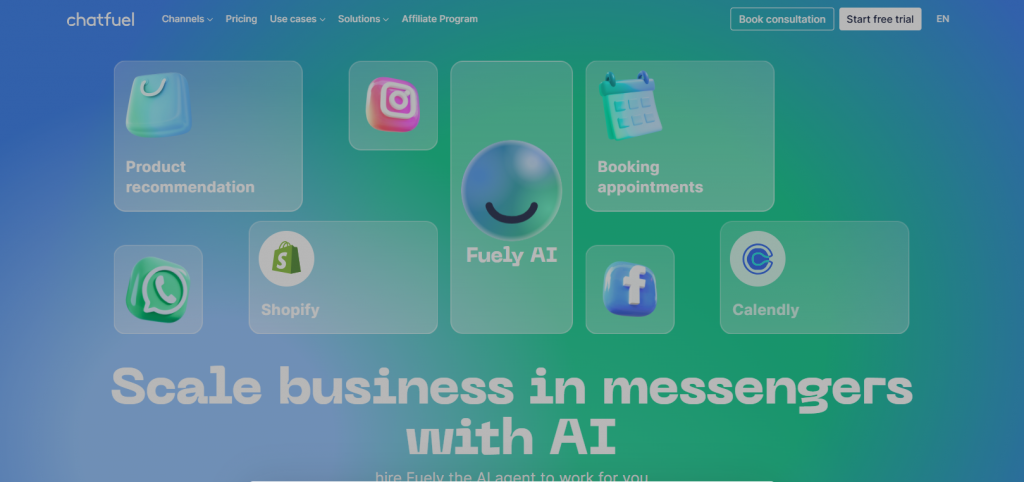
Chatfuel is designed primarily for building AI chatbots on Facebook Messenger and Instagram. It’s a popular choice for businesses looking to automate conversations directly within social platforms.
Businesses focused on social media marketing and engagement through Facebook and Instagram.
This table highlights the best use cases, supported channels, no-code capabilities, AI features, and language options so you can quickly compare and choose the right chatbot for your business.
| Chatbot | Best For | AI Capabilities | Customization & Controls | User Feedback Highlights |
|---|---|---|---|---|
| YourGPT | Enterprise-grade automation for support, sales, operations | Document-heavy workflows, retrieval logic, AI-assisted agents | Highly customizable, API-driven, granular permissions | Learnable, accurate, improves CX; setup can be technical (bigsur.ai) |
| Kore.ai | Enterprise conversational AI with security and compliance | Advanced NLP, logic-based AI agents | Industry templates, UX design for virtual agent workflows | Robust compliance, widely used in IT and support automation |
| Leena AI | Human Resources automation and internal employee support | AI-powered HR workflows and knowledge automation | HR-focused templates and process automations | Favored in regulated sectors for HR-specific automation (Gartner) |
| Yellow.ai | Global, multilingual customer engagement at scale | Generative AI workflows and industry-specific NLP | Extensive multi-language and channel support | Strong global reach; onboarding complexity noted |
| ManyChat | Marketing automation and social media sales funnels | Rule-based flows with basic automation | No-code builder optimized for social campaigns | Easy and effective for SMB social automation; broad adoption |
| Gupshup | Conversational commerce and transactional messaging at scale | Agentic AI features, dynamic routing, LLM-based generation | Pre-built workflows, business messaging integrations | Strong ROI, recognized for scale in BFSI and retail |
| Chatfuel | Simple automation for Messenger and Instagram | Keyword matching with basic personalization | Quick to build and deploy on social platforms | Affordable and easy to use for SMB marketing |
The best AI chatbot for your business is not the one with the most advanced features. It is the one that directly solves your biggest challenges.
Choosing the wrong tool can result in wasted money, frustrated teams, and poor customer experiences. Before making a decision, focus on these five areas:
Start with the outcome that matters most:
A chatbot should fit into your existing tech stack. Confirm that it connects with your CRM, eCommerce platform, helpdesk, and analytics tools. Poor integration often leads to more manual work.
Think about long-term growth. Can the platform manage more conversations as your customer base expands? Does the pricing scale fairly with usage? Compare the cost against potential ROI in staff time saved, faster sales cycles, and improved customer satisfaction.
A good chatbot does more than just respond to questions. It should also provide valuable insights. Look for reporting tools that show performance metrics, identify drop-off points, track customer sentiment, and highlight trends in user queries. With these insights, you can continuously improve both the chatbot and the customer experience.
An AI agent goes beyond answering questions. It can complete tasks during the conversation such as booking appointments, qualifying leads, processing refunds, or automating workflows. Traditional chatbots mostly follow scripts and handle simple FAQs.
AI agents reduce costs, improve efficiency, and deliver faster support by taking action instead of only providing answers. They help with support, workflow automation, bookings, lead qualification, and HR requests in one continuous interaction.
Common tasks include customer support responses, ticket triage, booking appointments, lead capture and qualification, HR FAQs, policy lookups, account updates, and simple report generation.
Define your main goal first such as lowering ticket volume, generating leads, or automating HR workflows. Shortlist platforms that integrate with your tools, match your budget, and scale with usage. Run a small pilot before a full rollout.
No. AI agents are best for repetitive tasks and real-time actions. Humans are still required for complex, sensitive, or high-value cases. A combined approach gives the best results.
Entry plans typically start around $15–$30 per month. Mid-range solutions with CRM integrations and analytics range from $50–$200 per month. Enterprise plans with compliance and large-scale automation can cost several hundred dollars monthly or use usage-based pricing.
ROI comes from lower staffing costs, faster resolutions, ticket deflection, and higher conversion rates. As more workflows are automated, the gains compound and the payback period shortens.
High-impact use cases appear in ecommerce, banking and fintech, healthcare, telecom, and HR. Typical wins include order tracking, account assistance, patient scheduling, troubleshooting, and employee self-service.
Most modern platforms offer no-code builders for setup and training. Coding helps when you want custom integrations or complex workflows, but it is not required for basic deployments.
Track response times, resolution rate, ticket deflection, customer satisfaction, conversion rate, and drop-off points. Use the platform’s analytics to identify improvements and iterate.
Chatbots are starting to transition into AI agents. In 2026, many businesses now use AI agents to handle tasks like Support, workflow automation, booking appointments, qualifying leads, supporting HR teams, and helping customers. When implemented well, AI agents reduce costs, improve efficiency, and provide customers with quick support.
Choosing the right AI agent means looking at your business goals, not just the list of features. Identify your main needs, such as lowering support ticket volume, generating new leads, or automating certain workflows. After that, review platforms that fit your priorities and test them with a small pilot before making a full decision.
Selecting an AI agent that matches your requirements can help you see a faster return on investment, increase customer satisfaction, and allow your team to focus on work that requires a human touch.
Join thousands of businesses transforming customer support with YourGPT AI
No credit card required • Full access • Limited time offer
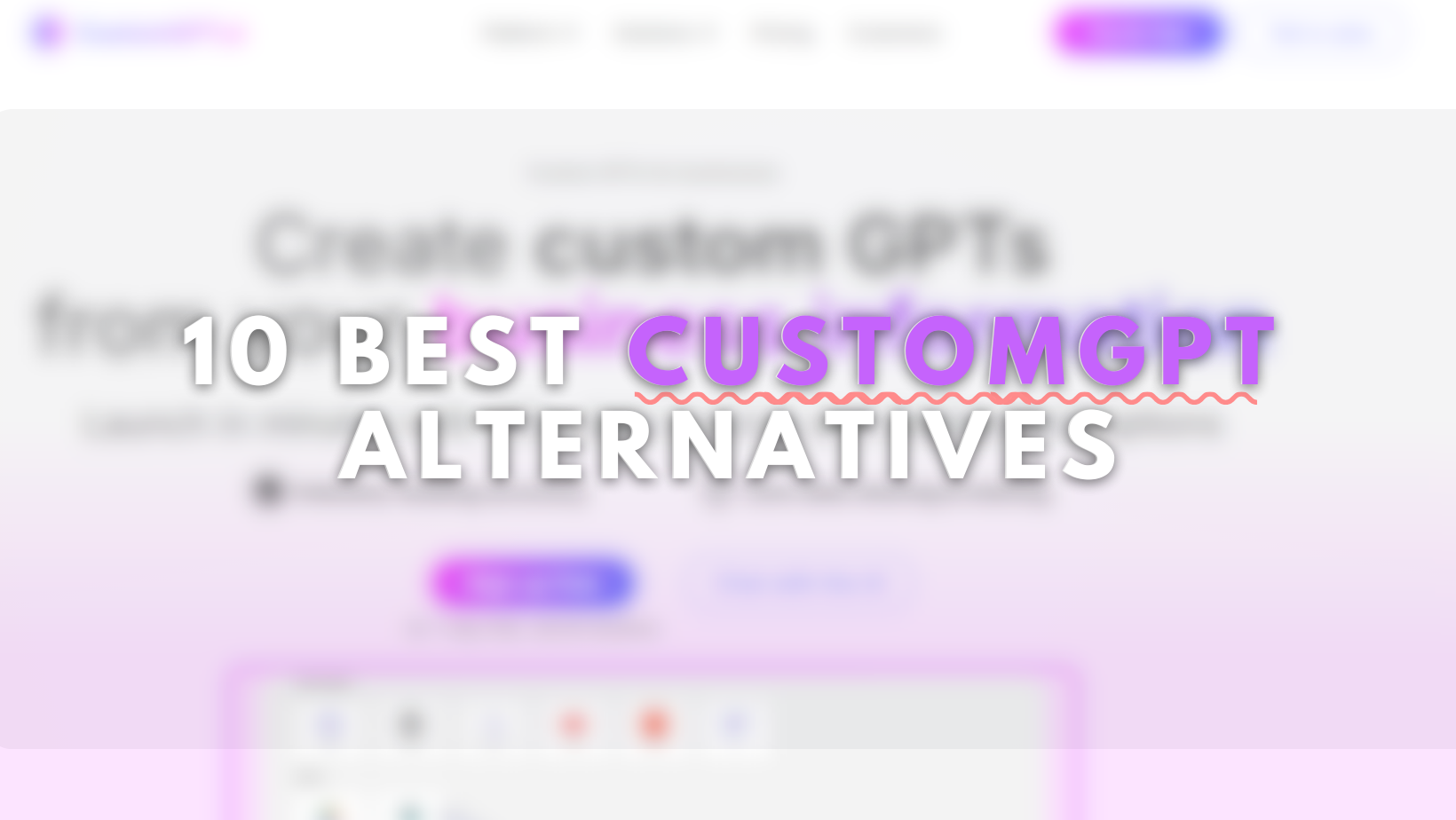
TL;DR CustomGPT.ai offers basic no-code chatbot features. This blog compares 10 alternatives with stronger automation, integrations, and flexibility for scalable customer support. CustomGPT is a no-code AI chatbot platform that allows businesses to build question-answering systems using documents and internal knowledge bases. It is primarily designed for retrieval-based use cases, where users ask questions and […]

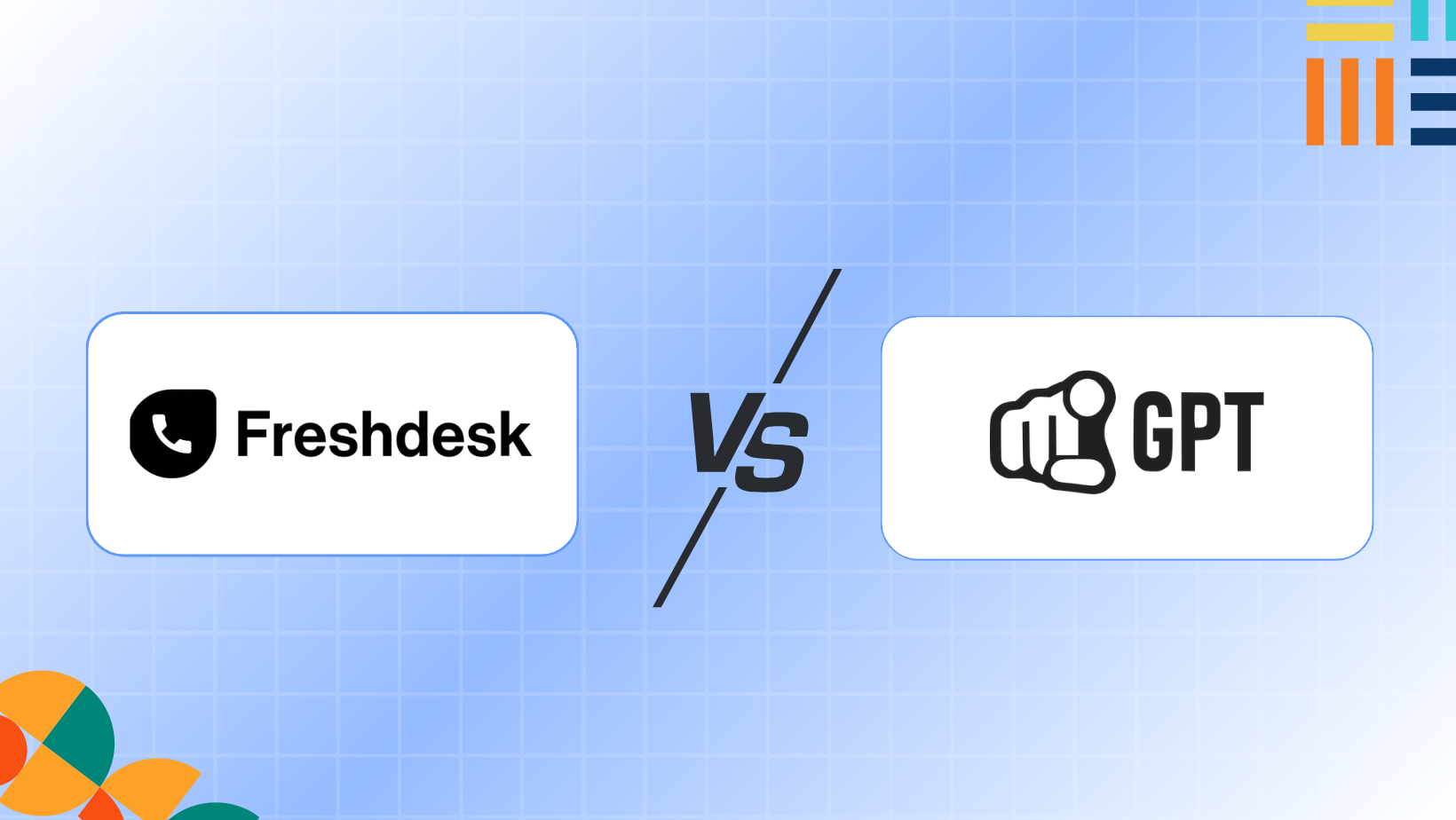
TL;DR: The Core Difference YourGPT Built around AI agents that handle conversations, run workflows, and resolve issues on their own across channels. The goal is to reduce incoming support volume by solving problems before they reach a human. Freshdesk Built around structured ticketing. It focuses on organizing queues, managing SLAs, and tracking agent performance. Humans […]


TLDR Zendesk works well for ticket-based support, but it can feel limiting as teams rely more on automation and multi-channel conversations. This guide compares 7 practical Zendesk alternatives that reduce manual handling and let AI manage common requests across chat and messaging tools Zendesk is one of the popular customer support platform has been around […]

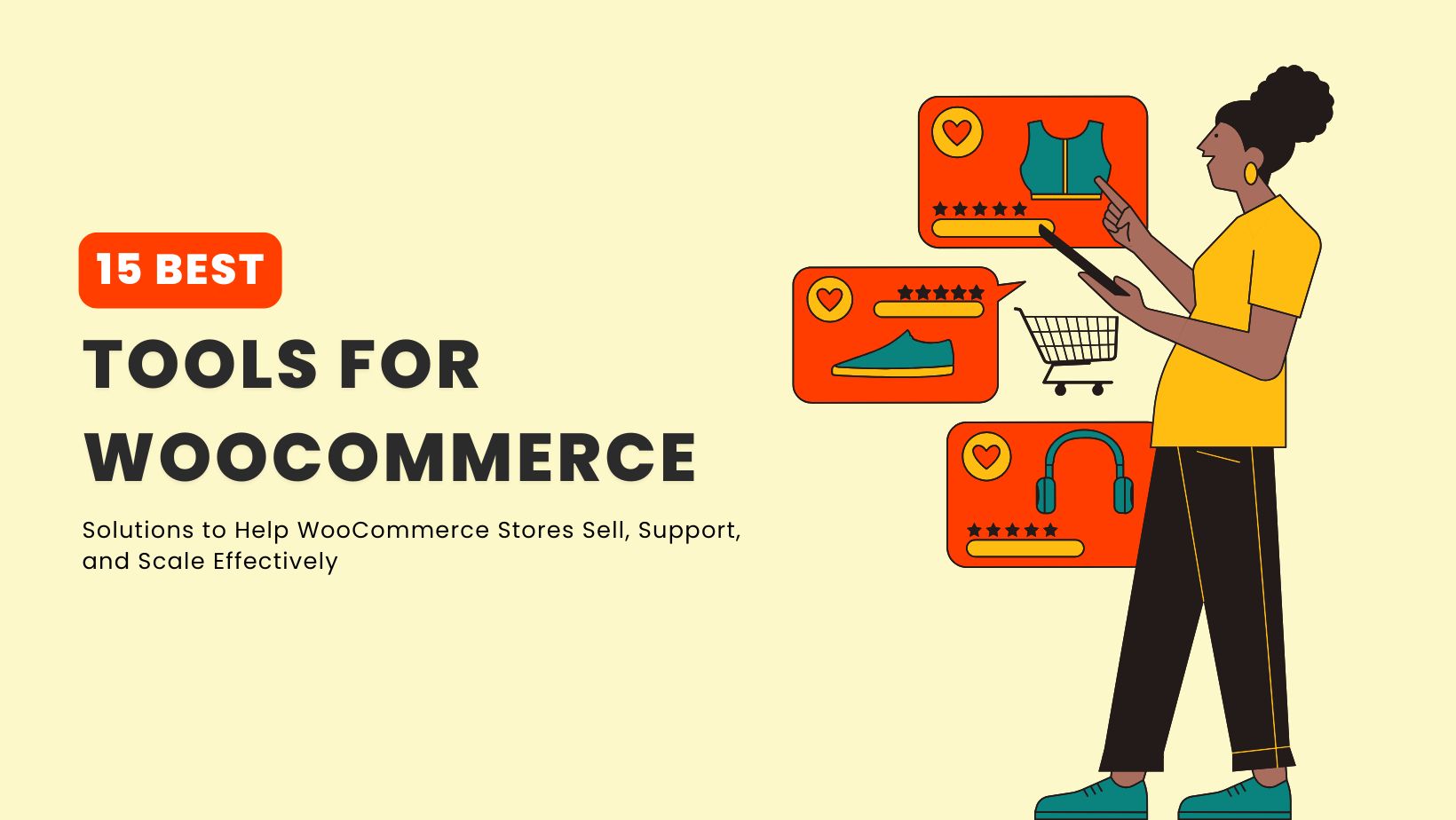
WooCommerce gives store owners flexibility, but that flexibility comes with trade-offs as a store grows. Over time, pages slow down as plugins accumulate, carts get abandoned without obvious reasons, and customer questions start consuming more time than expected. These issues rarely appear all at once, but they compound quickly and directly affect revenue. After working […]

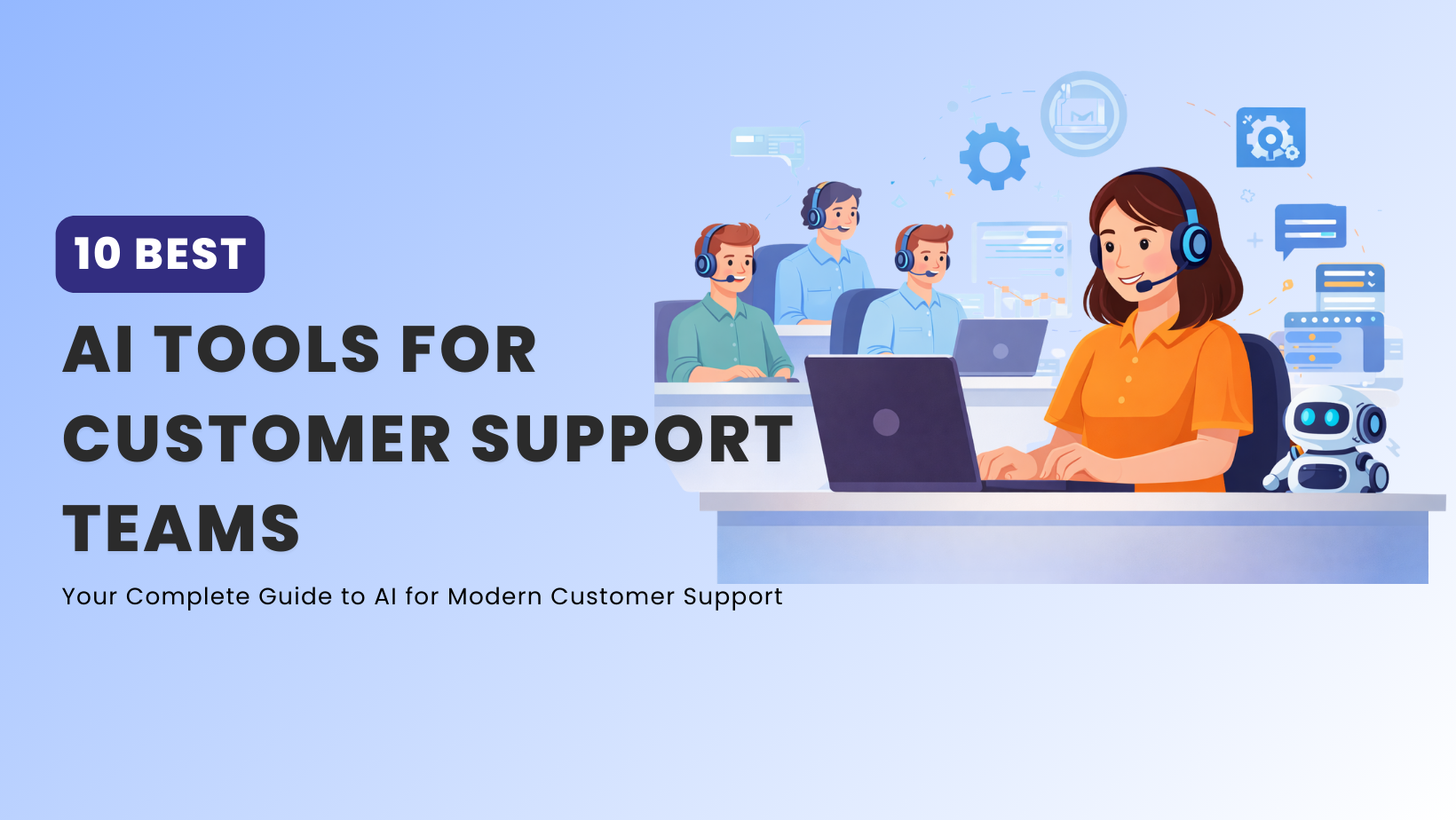
AI customer support tools now form a core part of how many teams handle growing contact volumes and rising customer expectations. At the same time, the market has become crowded, with many similar-looking products and overlapping claims, which makes evaluation harder for support leaders. The AI customer service segment grew from about $12 billion in […]

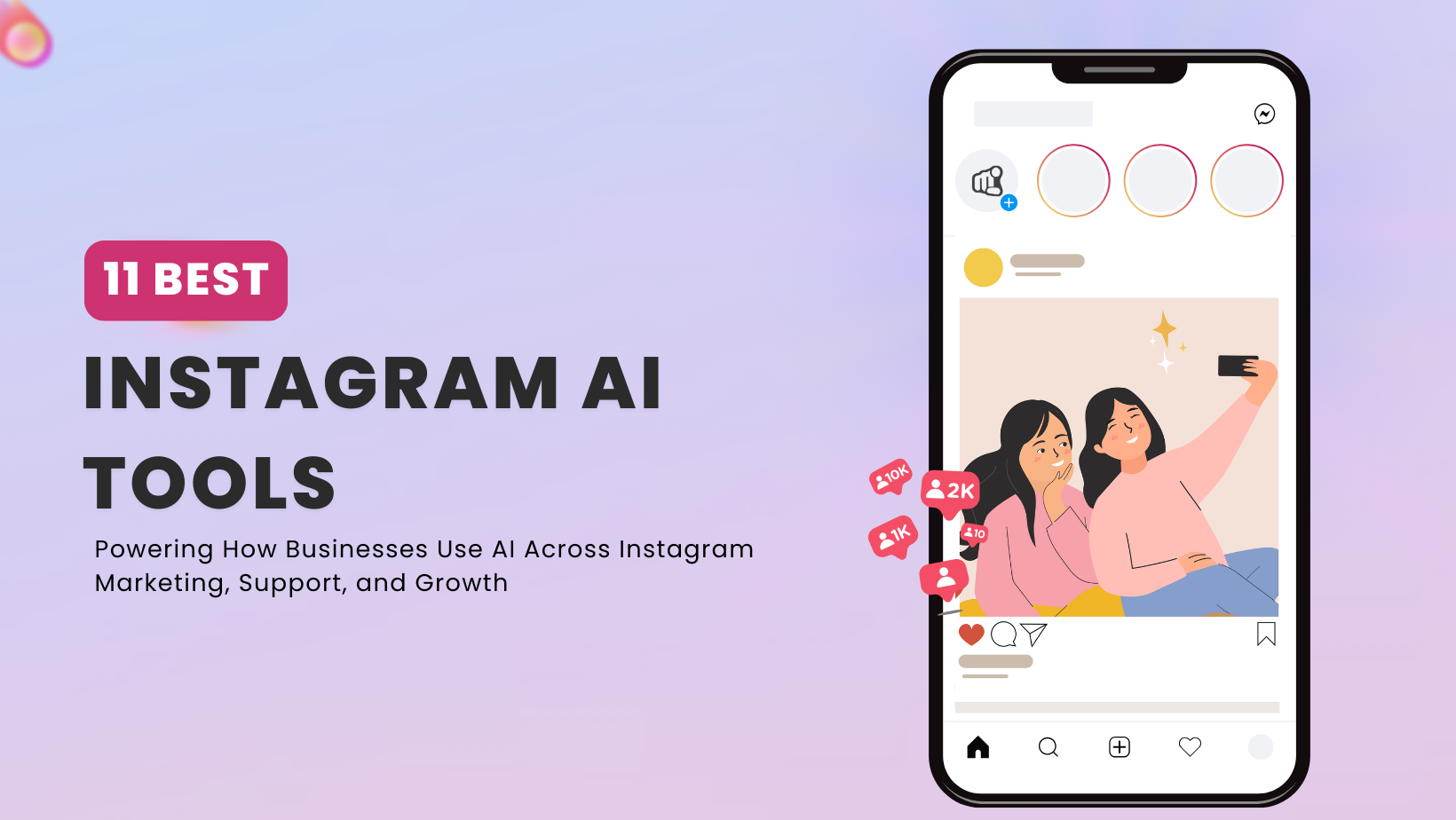
If you run an Instagram account for business in 2026, you already feel the pressure. The platform has 2 billion monthly users now. About 44% of people on Instagram shop every week, and most expect you to reply to their messages in under an hour. Between creating posts, Stories, and Reels, answering DMs, responding to […]
